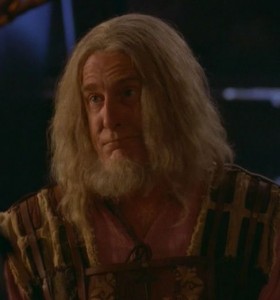As long as I’m talking about parenting, two anecdotes:
1) We teach on the MLK holiday, but I had time to take my no-school-that-day daughter out to lunch. We ended up talking about a bunch of things, but at one point she decided that she needed to know about the entire continuity of the character of Green Lantern. I attempted to escape the subject at several points, but she was fairly implacable. Somewhere around “and then it was revealed that Parallax was actually a yellow fear demon and Hal Jordan came back to life”, I was getting some pretty serious wtf glances from other diners.
2) My daughter’s birthday parties each year revolve around a theme that she selects, and I usually end up playing a character relevant to the theme. This year is Greek mythology, so I’ve decided to be Fredalus, Daedalus’ obscure and not very successful cousin.
The interesting thing to me about the interest in mythology is that it wasn’t really sparked by the Percy Jackson books: those followed on rather than preceded her engagement with the myths. She found them the way that I did, by reading the D’Aulaires’ Book of Greek Myths well before the film of the first Percy Jackson book came out. What’s especially interesting is that there’s a lot of general interest in Greek mythology among children that we know and her cousins as well, and at least some of the other kids we know took the same path to getting interested in the subject.
This is another one of those cases of cyclical cultural themes where a complex-systems approach is very helpful as an interpretative tool, partly because it helps defer some of the tendency to overread the intentional or instrumental meaning of this kind of recurrence (of the sort that I think WJT Mitchell slides into at times in The Last Dinosaur Book).
There’s certainly an “interested” historical explanation for why classical Greek literature and culture have remained in circulation within a Western society which has self-consciously defined the West as derived from Greco-Roman precedents, but the lightly sanitized (although the D’Aulaires version delightfully keeps some of the edgier elements in view) simplified apparatus of Greek mythology has some of the same root-level attractions as dinosaurs, Pokemon, Harry Potter, superhero comics or Star Wars. The individual stories tie into a comprehensively imagined and interconnected world and effectively teach children how to master two important kinds of systematic knowledge: taxonomy and intertextuality. That mastery then yields social rewards in relationship to other children who’ve also taken an interest in that cultural system. The D’Aulaires’ approach encourages a reader to learn the names of gods, demigods, heroes and kings, and to understand how different types or taxa interrelate within those stories. They also encourage young readers to not only relate the stories as they tell them but to relate their telling of stories to other tellings of the same stories by different authors and from different times.
I think these kinds of mythoi have some of the same “procedural” learning involved that you see in certain digital games and media: they not only teach content but they teach a mode of learning content at the same time, in autodidactical combination.
All of which is a TL;DR way of saying that I’m happy to be Fredalus supervising a “cut the head off the Medusa” version of pin-the-tail-on-the-donkey.


I blogged recently about my 7 y.o. daughters’ discovery of the D’Aulaires books… they love the Norse ones too and correct my pronunciation of names like GR??HILDR & SIGUR??. http://tinyurl.com/4vbbxy6
D’Aulaires’ Book of Greek Myths
Ah, I adored that book as a child! And you capture its appeal wonderfully: it presents, in accessible language, a fully wrought world, not a wholly sanitized one, but with all the failures and darkness that any true myth of how the world works (or doesn’t) would have to have. By internalizing those ambiguities, retelling them to ourselves, we become that much more a part of their storytelling. (Not that I thought about it in those terms as a kid; mainly, my brother Daniel and I just used the myths for imaginary adventures. I was always Hermes.)
We have a copy of the book, and our daughters have beaten it up just as much as my older brother and I did. I can’t say their fascination with those stories preceded their interest in Percy Jackson; they came along together, I think. We were lucky enough to catch onto to Rick Riordian right from the start. Have you read “Lost Hero” yet, Tim? I didn’t love it, but what a fabulous lead-in to the next volume!
The coherence of the imagined world of Greek myths is one of its odder features, in fact. Particularly in chronology – there are parts of the “historical” tradition that are a good bit more indeterminate than the clarity with which Greek myths keep Heracles and Achilles in distinct periods. There are reasons for this, but it’s not hard to imagine a situation in which the oral traditions of separate communities scattered across the Mediterranean over a period of hundreds of years might have produced something much less stable.